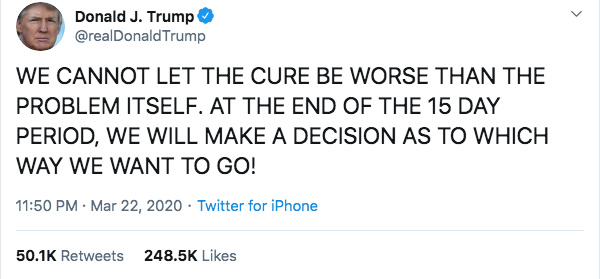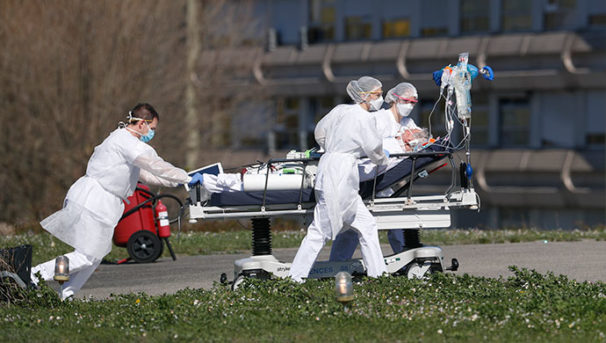
The Trump Labor Department has ordered individual states not to reveal their unemployment numbers, but when the national total comes out later this week, it is expected to be in the millions. With retailers, restaurants, hotels, airlines, theaters, factories, and more closed down, paychecks will soon stop for many workers, if they haven’t already.
The most dire prediction of what we’ll be facing came yesterday from James Bullard, president of the St. Louis Federal Reserve Bank, who said unemployment may hit 30%. That’s more people without jobs than even the worst days of the Great Depression when the previous highest record was set—24.9% in 1933. During the Great Recession a decade ago, 10% were out of work at the peak.
Bullard says we’re looking at a drop in U.S. GDP of as much as 50%, which would mean at least $2.5 trillion would be needed to cover all the income lost by U.S. workers. Without government action, things will get very bad, very fast.
Yet the president spent a considerable part of his Sunday press conference asking for your pity in this time of global crisis. Not for American workers facing unemployment or health care professionals struggling to keep people alive, but for him.
In response to a reporter’s “nasty question” about whether he had sold stocks or made any changes to his investments in advance of the virus (like many U.S. senators did), Trump launched into a monologue about how much he sacrifices:
“It cost me billions of dollars to become president…”
“I knew it was going to happen…when I ran, I said, ‘It’s going to cost me a fortune.’”
“It’s very hard for rich people to run for office.”
“Everybody knew I was a rich person. I built a great company and people knew that, but I agreed to do things I didn’t have to do, I still don’t have to.”
“It costs me billions of dollars to be president. And especially with all the money I could have made for the last three, four years, and I didn’t because I was being president.”
“George Washington, they say he was a rich man supposedly, relatively rich, and he ran the presidency and he also ran his business. They say he had two desks. Nobody complained until I came along. I got elected as a rich person, but nobody complained until I came along.”
“I committed publicly that I wouldn’t take the $450,000 (presidential) salary. It’s a lot of money. Whether you’re rich or not, it’s a lot of money, and I did it. Nobody cared. Nobody said, “Thank you.” Nobody said, “Thank you very much.”
But while he’s asking us all to feel sorry for him, the rest of the country continues to wonder where their government is when they need it most. There are still not enough tests, not enough respirators, and the federal government is missing in action when it comes to coordinating production of medical supplies.
The president’s daily press conferences are a mishmash of mostly useless (dis-)information and bombastic filler. Every afternoon, the Coronavirus Task Force trots out a few new pieces of one “plan” or another that is supposedly in the works, with a miracle always only a day away.
Then, Trump will repeat some of the same claims he’s made for days on end that have still not materialized—like the millions and millions of masks that are waiting and ready to go (States just haven’t asked for them!) and tests-on-demand (Everyone who wants a test can get one!). Stories of hospitals running out of protective gear and governors unable to get tests for their state are dismissed as fake news.
But as long as his remarks are peppered with enough words or phrases like “great,” “unprecedented,” “biggest,” “beautiful,” or “never done before,” the president thinks he can substitute hyperbole for action. It’s been his trademark for decades.
Back in his (ghostwritten) 1987 book Art of the Deal, Trump said, “People want to believe something is the biggest and the greatest and the most spectacular…. I call it truthful hyperbole.” He went on to say, “It’s an innocent form of exaggeration and a very effective form of promotion.”
Such an approach is what you’d expect from a con-man trying to close a big real estate deal or convince some sucker investors to sink money into a failing casino. But now the con-man is in the White House and in charge of saving our health and our economy from the deadly threat of COVID-19.

The reality unfolding across the country is a world away from the fantasy being spun as part of “The President’s 15-Day Plan to Slow the Spread” that is constantly mentioned by Trump, Pence, and other administration officials. Does any serious person really think this will all be over at the end of this magical 15 days? Top health experts like Dr. Anthony Fauci don’t.
But if you read between the lines of Trump’s midnight tweets, it looks like he’s planning to send everybody back to work in a week, even though those who know better say the #StayHome campaign has to continue.
With the stock market having totally wiped out all the gains it’s made since he was elected, the “wartime president” is so eager to declare victory over the coronavirus that he appears willing to risk the health of American workers in a last-ditch effort to re-open all businesses and put a floor under stock prices.
Meanwhile, states and hospitals continue to face dire shortages of the protective equipment that health care workers need to test and treat coronavirus patients. Governors from California to New York and many points in between spent Sunday pleading with the president to utilize the Defense Production Act (DPA), which would allow him to direct private industry to manufacture the items in shortest supply now—masks, gowns, ventilators, and respirators.
But Trump refuses, so far, to break the golden rule of capitalism: Don’t touch the free market. “We’re a country not based on nationalizing our business,” he said on Sunday when asked about the DPA. “Call a person over in Venezuela and ask them how did nationalization of their businesses work out.”
Never mind that the DPA is not a program of nationalization or business takeovers, but rather a means to determine what is needed and coordinate its production. As the New York Times reported Sunday, business executives themselves remain confused about what supplies they should be making, how much they should be making, or where they should be sending it first. Trump spends his time railing against a nationalization plan that nobody proposed, yet still praises himself for “invoking” an act he still hasn’t used.
Facts, again, be damned.
So instead of a centrally directed system of production, pricing, and distribution, we have a situation where 50 states, thousands of hospitals, and the federal government itself are all competing against each other in the open market for masks and respirators. Everyone is now in what New York Gov. Andrew Cuomo calls a “mad bidding war.”

Trump’s FEMA director, Peter Gaynor, on Sunday told governors to, essentially, go get supplies themselves: “If you find it on the market, go ahead and buy it.” Illinois Gov. J.B. Pritzker says it is like the “Wild West…out there,” and that states and hospitals are being forced to overpay for health equipment “because of that competition.” He said there was one instance where Illinois was competing against the federal government in an auction for an order of masks.
Rep. Alexandria Ocasio-Cortez criticized Trump’s refusal to use the DPA, saying, “We cannot wait until people start really dying in large numbers to start production, especially of more complicated equipment like ventilators and hospital beds.” She said there was no time to waste, emphasizing that “We need to start this production right now to get ready for the surge that is coming in two to three weeks.”
New York City Mayor Bill de Blasio was even more direct: “We’ve gotten no indication of any factory on 24/7 shifts. We’ve gotten no shipments. I can’t be blunt enough: If the president does not act, people will die who could have lived otherwise.”
What kind of government is this? Even when the lives of millions are under direct and immediate threat, still we must all bow before the gods of the free market?
Supply and demand determine price, and the price will rule over us all until we go to the grave. Given Trump’s management of this crisis up to now, it’s an unfortunate truth that thousands more will have to pay the wages of death for Trump’s sin.
But don’t worry about all of that. The saddest part of this whole messy affair, apparently, is that a rich man lost billions of dollars by being your president.
Poor Trump. Can’t get no satisfaction.












Comments